Sept. 20 with Parent Avengers, Westside Future Fund, Quest Communities, Atlanta Volunteer Lawyers Foundation and CHRIS 180
The Sept. 20 Transform Westside Summit featured a panel of nonprofit organizations that deliver wrap-around services to Hollis Innovation Academy families. Representatives from Parent Avengers, Westside Future Fund (WFF), Quest Communities, Atlanta Volunteer Lawyers Foundation (AVLF) and CHRIS 180 spoke with Summit attendees about school mobility on Atlanta’s Historic Westside.
As the presentation began, Sherry Bellille, co-founder of Parent Avengers, shared a common vision echoed throughout the Summit by each nonprofit represented on the panel: “I want to help residents stay in the community, secure our schools, preserve our culture and make neighbors unified,” she said.
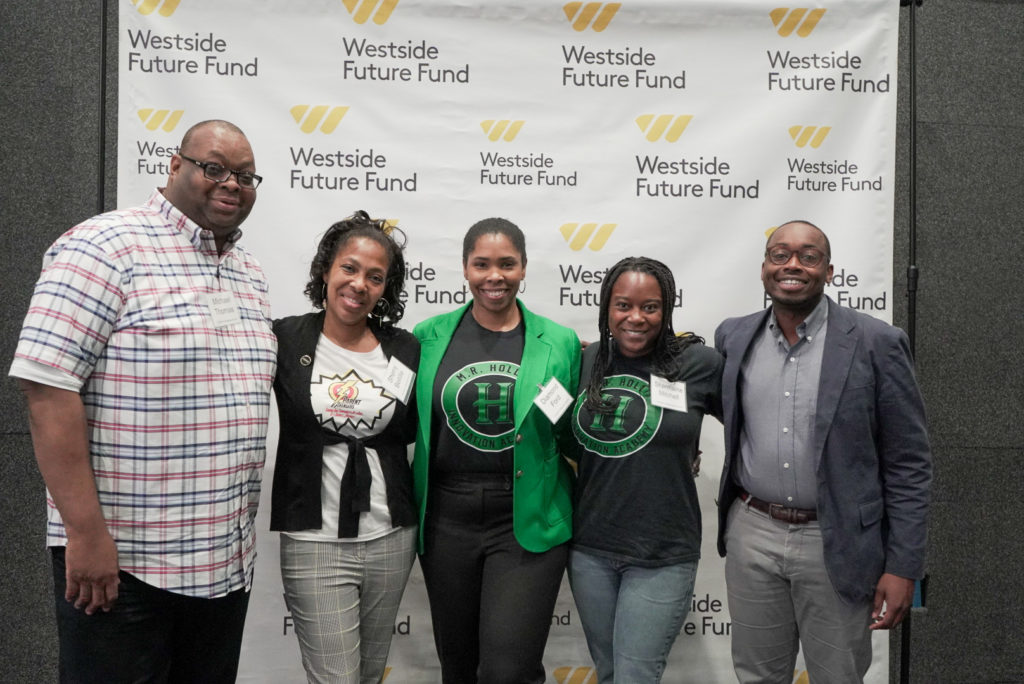
Atlanta Volunteer Lawyers Foundation
Ayanna Jones-Lightsy, co-director of the Safe and Stable Homes Project at AVLF, explained one way her organization seeks to achieve this goal – through the Standing with Our Neighbors™ program. “We put a lawyer and a community advocate in the schools that are facing displacement, transiency and school mobility issues to alleviate one of the main barriers people have to getting justice: access.”
Since AVLF placed an advocate and lawyer at Hollis Innovation Academy in 2017, the organization has
- Assisted 93 families.
- Helped 45 residents prevent evictions.
- Assigned 78 cases to top Atlanta law firms that represent these cases.
Often residents feel they have no alternative but to leave, explained Jones-Lightsy. “The lawyer and community advocate are there to say, ‘You don’t have to leave. You do have rights.’ There is someone here that’s going to stand up for you and make sure that your home is safe and stable, to ensure you can stay in the schools that provide amazing opportunities for your students to grow and learn.”
Whether families are facing affordability difficulties, illegal evictions or poor living conditions, AVLF works to combat displacement to keep students in schools where they are. Jones-Lightsy added that simply having an attorney present causes landlords to take notice and forces counter claims to be heard.
“We’re so excited that we have this program here on the Westside – boots on the ground – to do the work that needs to be done to keep the residents in the community and fight displacement,” Jones-Lightsy said.
Westside Future Fund
As Jones-Lightsy passed the microphone down the panel, Rachel Carey, vice president of project financing for WFF, shared her extensive background in affordable housing finance and experience working on affordable housing projects in New York City and on Atlanta’s Westside.
“Subsidy is really the key to creating affordable housing,” Carey said, explaining that blending different types of funds and going after subsidies enable affordable housing initiatives.
Over the course of the last year and a half, Carey and the WFF team have intentionally sought out and purchased homes and apartment buildings across the Westside that truly address the needs of the families who want to be near areas of public investment. Additionally, by purchasing properties that are under pressure by the market, WFF can leverage its philanthropic funds and impact capital funds to ensure properties stay affordable and cost residents no more than 30% of their annual income.
“That’s really been our strategy as the real estate team—acquiring units across the community and putting together a housing program that addresses needs at every level in terms of affordability for families of all sizes,” Carey said.
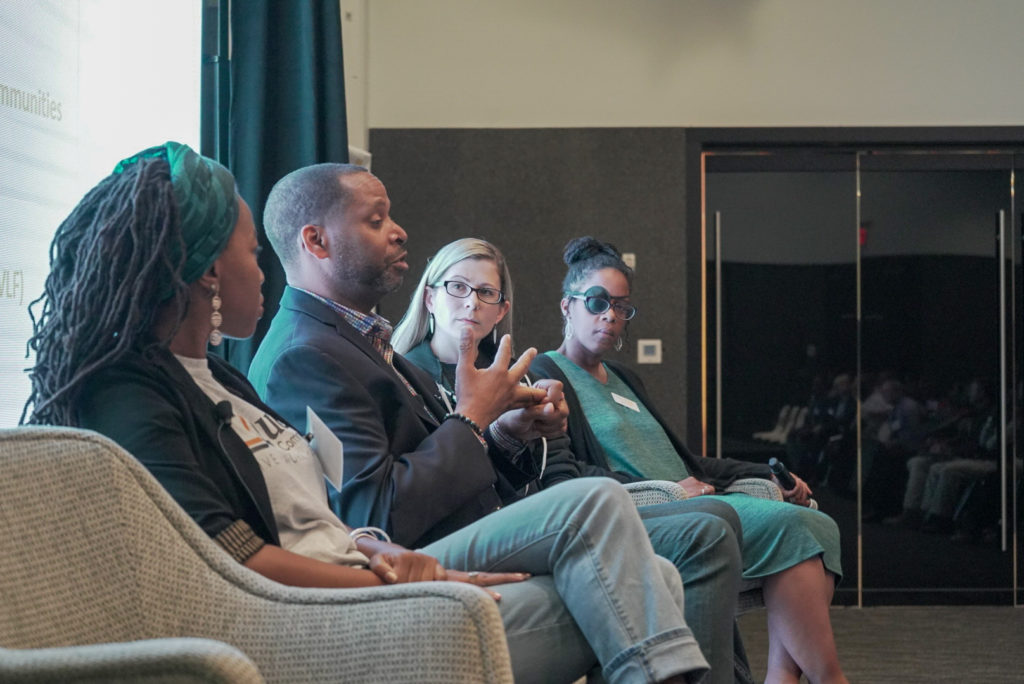
CHRIS 180
Though affordable housing initiatives are at the forefront of many conversations today, when James Tomlin, housing manager at CHRIS 180, joined the At-Promise Center in 2017, the organization didn’t recognize the deep need for affordable housing across the Westside in the same way it does today.
Tomlin remembers an early experience at CHRIS 180 when he learned of a student in the Washington Cluster whose family was living in a dilapidated housing situation while he lived in a boarding home.
“His attendance was down, and he was constantly having behavioral and academic issues,” Tomlin said. After asking questions and having in-depth conversations with those involved, Tomlin and his team knew they needed to identify a more stable living situation for the student. With the family unable to afford market-rate rent, let alone a first month’s rent and security deposit, CHRIS 180 and its partners, including Columbia Residential, identified a way to transition them into a better housing situation.
“Immediately – and I mean immediately – once they moved into a more stable environment, everything else fell into place,” Tomlin said. “He started getting to school on time because the bus came right to his house. His attendance went up. His academic scores went up. His behavior issues changed.”
CHRIS 180’s assistance didn’t stop there. They offered additional counseling and support to the family to further foster success.
In collaboration with partner organizations, CHRIS 180 and the At-Promise Center have housed approximately 150 families inside the Washington Cluster in the last year. Additionally, they were able to provide rental and utility assistance for nearly 25 more families.
“It’s a lot of work that has to be done on the front end before we move a family into a more stable housing situation,” Tomlin said, explaining the necessary steps and documents needed to make the transition. However, he encourages families to be patient and stick with the process. “It’s not always an overnight success. It might take three or four months, but rest assured, there are people working hard to make sure it happens.”
One thing Tomlin has seen first-hand? “It changes everything,” he said. “It changes the financial opportunities that they have for themselves. It changes the relationships they can have with their family. It enables them to create traditions and norms that most of us experience on a daily basis.”
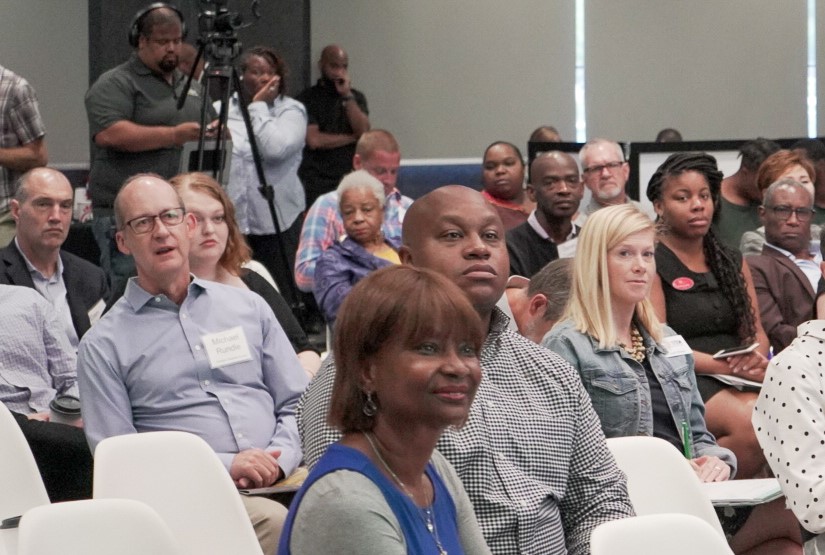
Quest Communities
To further enable this kind of life-changing transition for families on the Westside, Quest Communities follows the housing-first model, which eliminates barriers to housing. According to Sha’Nelle High, supportive services program manager at Quest Communities, the housing provided through the organization is both permanent and supportive housing. Permanent means residents can stay as long as they want to, as long as they abide by the agreement of the program, and supportive means residents always have an individual case manager assigned to them and available as needed.
“Another great thing about our program is that [residents] only pay 30% of their income,” High said. “So if they come in and their income is $0, they pay $0 in rent.”
How does the rapidly changing market affect Westside families?
Following the information given about each respective organization and its affordable housing efforts, Bellille posed a question to the panel about the impact the rapidly changing real estate market is having on Westside schools, families and students.
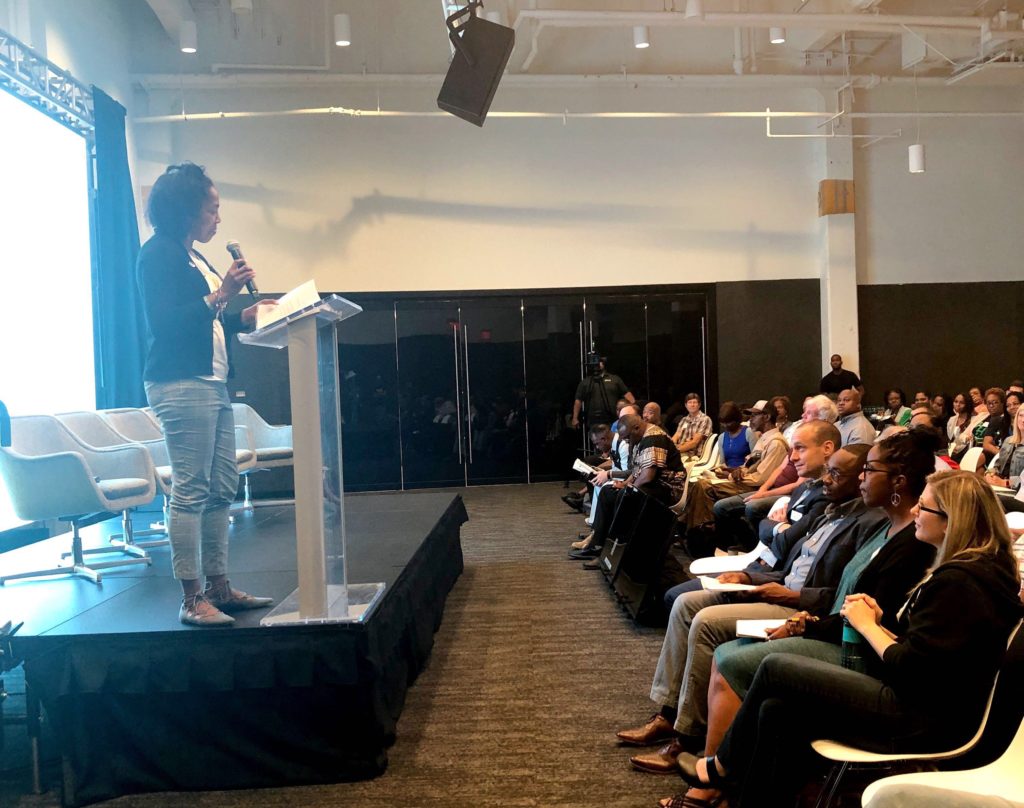
Panelists spoke to the inevitable instability associated with rising costs and the challenges that come when students are displaced and have to change schools, make new friends, learn new systems and meet new teachers. According to High, it causes a lot of pressure and limits what students can achieve.
Tomlin added that the stress often prompts families to make housing decisions that are not conducive to the entire family, such as moving into a dilapidated home — somewhere not meant for human habitation — or into a hotel, which can be expensive.
“We’re doing everything we can to create a place for families and to prioritize families with children in school in this cluster,” Carey said, citing the need for single-family homes rather than small, two-bedroom apartments. “It’s something that we think about with every acquisition that we make. We are trying to make sure that we are bringing enough to the table to meet the needs of these families to reduce student mobility.”
Jones-Lightsy acknowledged that people who have lived in their neighborhoods for generations will leave – or have to leave – when they cannot afford to stay, which has a massive impact on students.
“It takes children six to nine weeks minimum to acclimate [to a new school] and to even be able to absorb the information,” she said. “And it takes teachers six to nine weeks to learn the students, to learn their habits, to become attached. If you’re moving [a student] twice a year, you’re not giving that child an opportunity to succeed. You are setting them up for failure, and you’re setting the teachers and the systems up for failure.”
In spite of the growing need, panelists concluded by recognizing progress and sharing the successful approaches they’ve seen taking place across communities. Each cited ways in which their respective organizations are working together to make a difference and provide hope for Westside families.
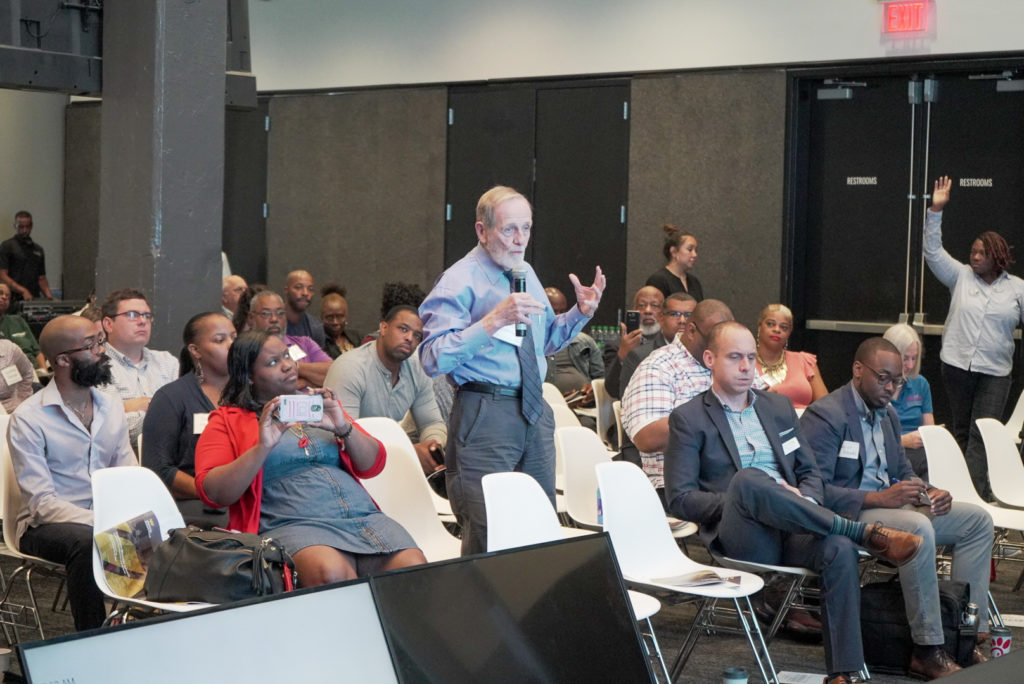
Q&A
During the final minutes of the Summit, attendees were given an opportunity to ask questions of the panel. One person asked panelists to quantify the number of families at risk of displacement and how many housing units are needed to alleviate the problem.
While the problem remains a difficult one to quantify, Tomlin answered by sharing that CHRIS 180 had more than 100 people come in seeking housing services last month alone and estimated that annually the organization faces approximately 800 individuals or families seeking housing assistance.
“There are actually a lot of housing opportunities on the Westside,” High said. “People just can’t afford them.”
To read more about the work Quest Communities is doing on the Westside, read our Aug. 16 Summit Recap. For more information about WFF affordable housing initiatives, read our Aug. 2 Summit Recap. For more about CHRIS 180 and services offered through the At-Promise Center, read our July 19 Summit Recap.
Opening Devotion with The Westside Singing Ambassadors
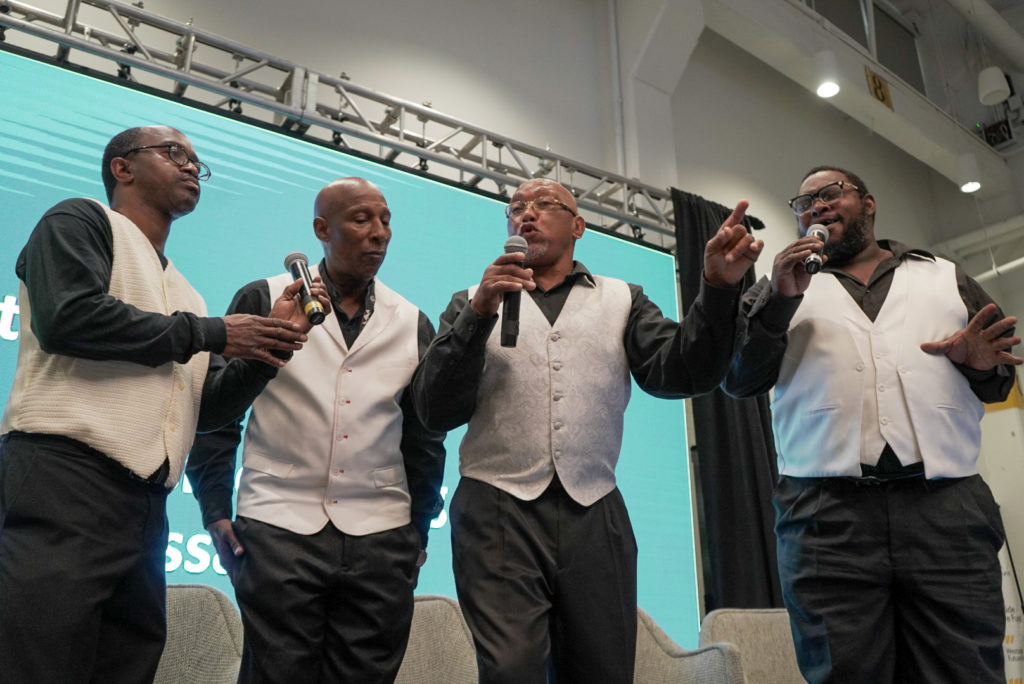
The Summit began with a moving, soulful performance by vocal quartet The Westside Singing Ambassadors. Through their melodical harmonies and infectious smiles, the group shared an uplifting story of survival and redemption, a testimony that all lives can be transformed. Each musician has spent most of his life in jail, and while troubles could have left them resentful and bitter, they each chose to rebuild their lives and use their musical gifts to give back to the community.
Additional Summit Highlights
- The next Westside Future Fund (WFF) Volunteer Day of Service will be on Saturday, Sept. 28. Register here.
- Free shuttle to the Summit: The Cute Shuttle offers free, scheduled pickups on the Westside to help residents get to and from Summit events on the first and third Fridays of the month. Learn more.
- Next Summit: Friday, Oct. 4. Register here.
- The Home Depot Gift Card Raffle: Summit attendees who are current Westside residents or who work for a nonprofit serving Westside neighborhoods have a chance to win a $50 gift card from The Home Depot at each Summit event. Congratulations to the Sept. 20 winner, pictured below.
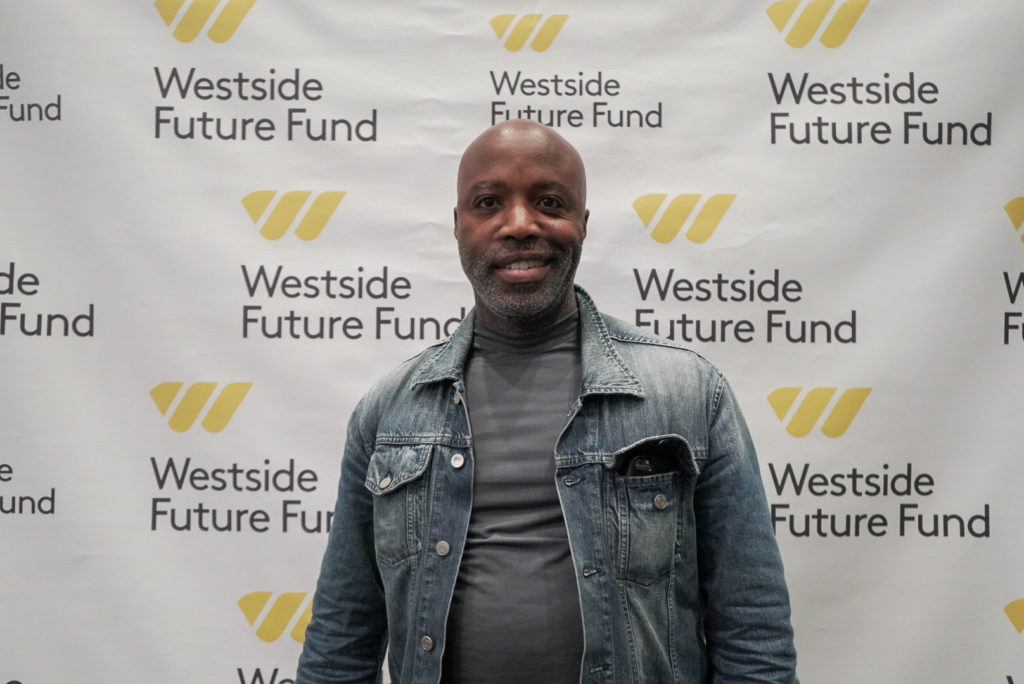
Meeting Materials:
- View the meeting presentation
- Download the event bulletin
- Check out our photo gallery
- Watch the Facebook livestream below:
Transform Westside Summit Friday, Sept. 20, 2019
Transform Westside Summit Friday, Sept. 20, 2019. Sept. 20 Agenda Devotion: The Westside Singing Ambassadors Featured Presentation: Panel Discussion on Wrap-around Services Targeting Hollis Innovation Academy Families, presented by: Sherry Bellille, Co-Founder, Parent Avengers Rachel Carey, VP of Project Financing, Westside Future Fund Sha'Nelle High, Program Manager, Supportive Services, Quest Communities Ayanna Jones-Lightsy, Co-Director, the Safe and Stable Homes Project, Atlanta Volunteer Lawyers Foundation (AVLF) James C. Tomlin, Housing Manager, CHRIS 180
Posted by Westside Future Fund on Friday, September 20, 2019
